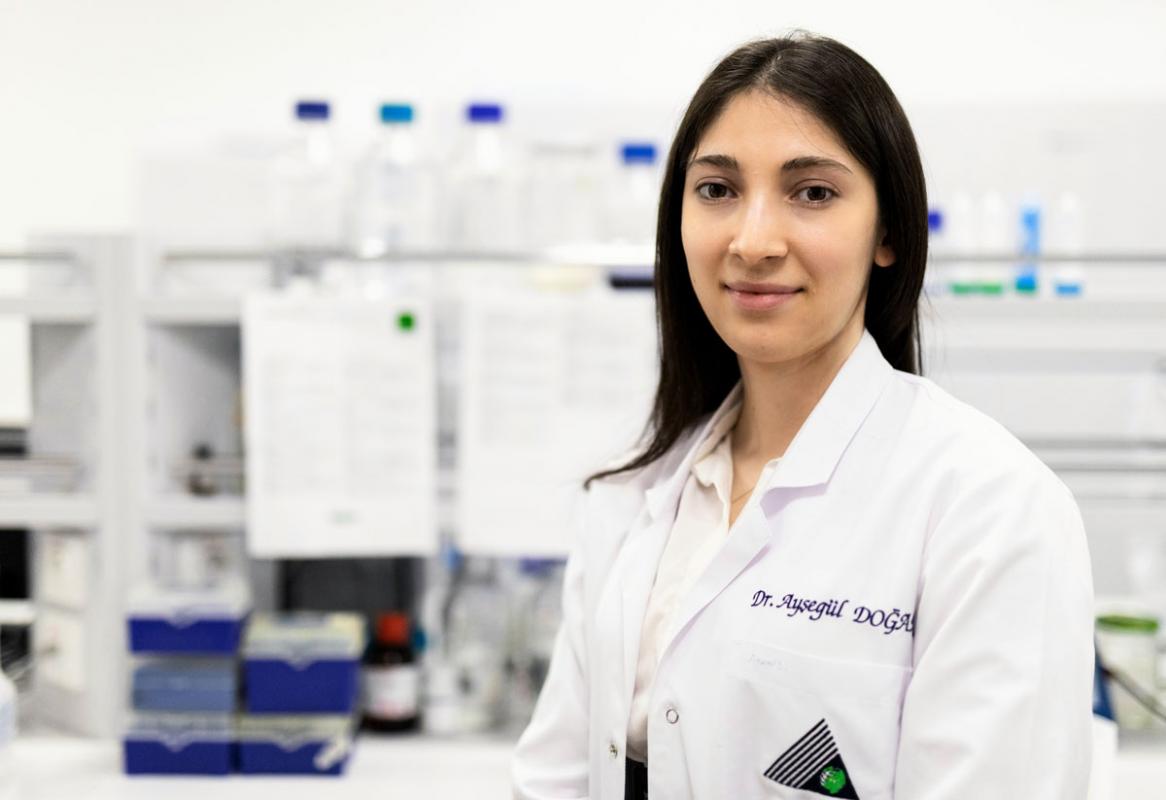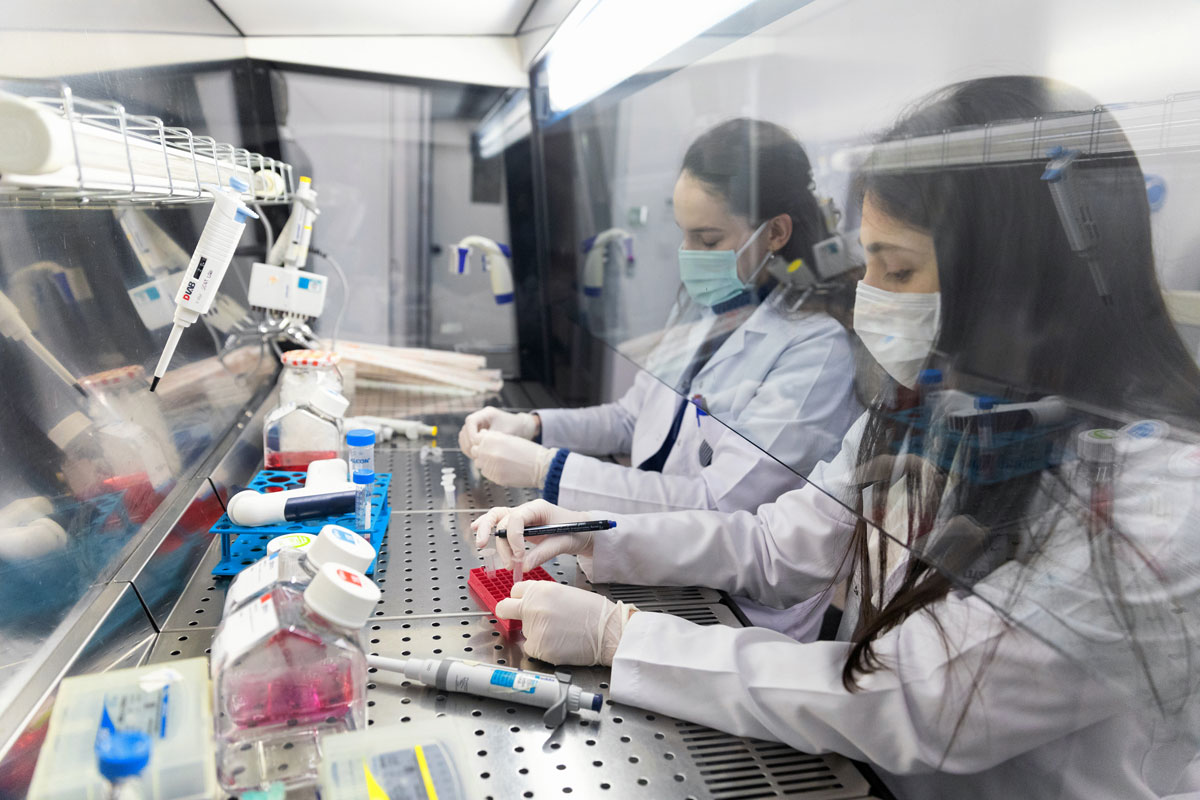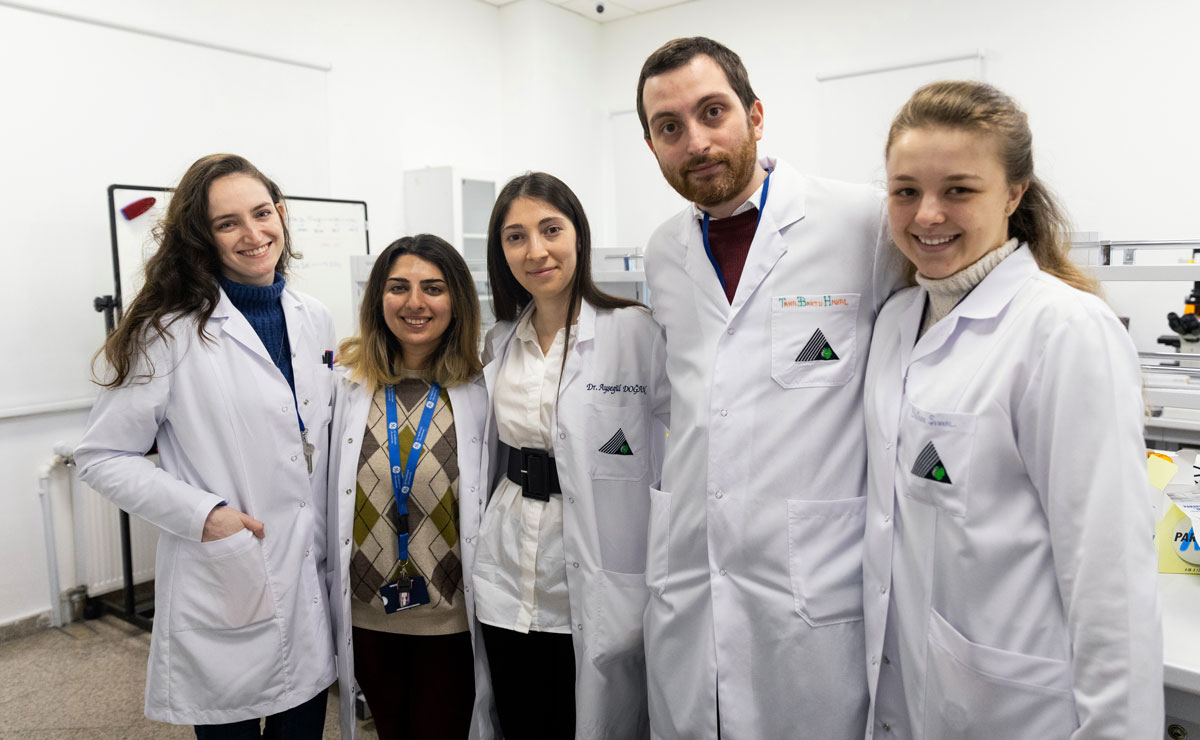She Collected Awards Thanks to Her Stem Cell Research
“Our faculty member, who has received the support of two different TUBITAK programs with her”pluripotent stem cell“ and ”organoid" studies, Assoc. Prof. Dr. Ayşegül Doğan was also awarded the ''Outstanding Successful Young Scientist Award'' (GEBIP) by the Turkish Academy of Sciences (TÜBA) last month.
“I am a Scientist Who Just Stepped into a Professional Life of Research”
A member of the Department of Genetics and Bioengineering at Yeditepe University, Assoc. Prof. Dr. Ayşegül Doğan, has a career which can inspire younger people. She continues to work tirelessly. Although she crowned his academic career with TUBITAK supports and TUBA awards at a young age, Assoc. Prof. Dr. Doğan states that: ''I am a scientist who just steppe into a professional life of research.

Assoc. Prof. Dr. Ayşegül Doğan, after graduating from Istanbul University, Department of Biology / Molecular Biology and Genetics in 2009 and receiving her master's degree from Yeditepe University, Department of Genetics and Bioengineering in 2011. She completed her doctoral studies in Yeditepe University between 2011-2015 at the Department of Genetics and Bioengineering's Department of Biotechnology Doctoral Program. Going to the United States a year later to do his postdoctoral research, Assoc. Prof. Dr. Doğan joined the Cell and Developmental Biology group at the National Institutes of Health, National Cancer Institute and started conducting her “pluripotent stem cell” research.
After two years, Assoc. Prof. Dr. Receiving the support of TUBITAK's “2232 - International Leading Researchers Program”, Doğan returned to her home country in 2018. As soon as she started working as a faculty member at Yeditepe University, she started working on establishing the necessary research infrastructure to carry out these studies in Turkey. She was a pioneer in the establishment of the “Stem Cell and Gene Therapy Laboratory”, also known as the “Organoid Laboratories”, at Yeditepe University. With her Pluripotent stem cell and organoid research, Assoc. Prof. Dr. Doğan also received research support from the Research Support Programmes Department (ARDEB) within the TUBITAK.
Conducting her work together with her team in the Stem Cell and Gene Therapy Laboratory, Dr. Doğan was awarded the 2020 Outstanding Young Scientist Award (GEBIP) by the Turkish Academy of Sciences (TÜBA) for her work covering all of her graduate studies last month.
Making Yeditepe University proud of her work and the award she received, Dr. Doğan also engaged in a pleasant convsation with us.
“Our Aim is to Make Cancer Modeling from Stem Cells”
You have become a source of pride for Yeditepe University with the support of TUBITAK and the TUBA-GEBIP award that you have recently received. Can we start by talking about your “Pluripotent” stem cell research that allowed you to receive these supports and awards? What are these cells?
Stem cells are cells that can self-replicate, they have the ability to self-renew and differentiate. According to their differentiation potential stem cells are divided into three main groups which are totipotent, plurioptent and multipotent. A feature that distinguishes pluripotent stem cells from others is their differentiation capacity. They are stem cells with an ability to transform all of the othr cells in our body. Since an unlimited capacity for differentiation allows for a risk of creating tumours, we cannot use pluripotent stem cells in the human body or in direct therapy. Therefore, by differentiating them, we obtain cells that can be used in therapy.
The “organoid system” research that allows you to get TUBITAK supports... What is organoid and how can it be used in treatments?
We can say that it is a miniature version of the organ. By differentiating stem-cells we create organ-like, three dimensional structures. These cell groups become miniatuorgans. The studies conducted on organoids became popular after 2012 and there are also studies regarding their use in cancer modelling in the literature. These organoids can be obtained in a laboratory via the cells taken from cancer patients and drug screenings can be performed on them. We work on modellings about bowel cancer. Our aim is to create cancer modelling via pluripotent stem cells and use it in research. And to have a contribution in the progress of a treatment by conducting research in these models.
Another research of us is about the obtaining of organoids which can excrete endocrines.
We cannot say that we can cure an Organoid structure by delivering it to a human body but there are a lot of research teams regarding this and we are trying to be one of those teams.
You were deemed worth of the 2020 Outstanding Young Scientist Award (GEBIP) which is given by TÜBA.
Yes. It is an award that we have received thanks to all of our research so far and for the research that we plan to do in the future. Some of these studies are national/international patented studies, their clinical trials have been completed and are now in the process of being licensed as products. These investigations have been carried out as a team and therefore, I would like to thank all my team as well.

We also want to get to know the person with her role of researcher and what she does outside of laboratory, we want to get to know Dr. Ayşegül Doğan. First of all, what influenced you to choose the field of genetics and bioengineering?
In fact, I didn't really focus on this area from the very beginning. Medicine and archaeology were actually the two professions I wanted to choose. I have decided to make this choice later on. I am currently satisfied with this choice.
What was your reason for choosing Yeditepe University for an academic career?
Our department head and my doctoral advisor Prof. Dr. Fikrettin Şahin has a great role in this choice. Bedrettin Dalan, our Founder and Honorary President of the University, and the support of our academic managers for research are the most important factors in my preference for Yeditepe University.
This year, Yeditepe University is celebrating its 25th year. What would you like to say about this?
Our university has created a well-established education and a rapidly developing R&D infrastructure in a process of 25 years. We are glad to contribute as a team for the further growth and development of this structure.
Do you have a life motto? Were there any principles that you set for yourself on the path that led you to success?
Working is the most important factor for a person to achieve success. I am a scientist who just stepped into a professional life of research I think it's too early to say that I've achieved success.
What feeds you? Have these made any contributions to your business life?
Although I have took a break from it for a long time, I am interested in painting. I try to keep a close eye on cinema. Of course, such activities do not have a direct impact on my work life. It has a positive effect in terms of taking time to relax outside of work.

“I Have a special connection with Istanbul”
What does travel mean to you? What is your favourite city both in Turkey and around the world?
I can't say that I am a very good traveler. The intensity of my work also does not allow such a thing nowadays. But compared to the countries and cities I have seen, Istanbul has always had a special place for me. There is even no need to express its natural beauty. The historical/archeological infrastructure is of great importance to me as well. Archaeology is an area that I want to prefer in my choice of profession, which in turn then presents a dilemma. In this context, I am interested in many cities in Turkey, but I can say that I have a special connection with Istanbul.
What kind of impact has the Covid-19 pandemic had on your workfield? What measures have been taken for sustainability in this process?
The Covid-19 pandemic has seriously affected the progress of our research and this will continue for some time to come. There is an obligatory reduction in workforce. There are serious disruptions in the production and transportation network regarding the international supply of consumables/materials necessary for the progress of research.
Of course, the process has a psychological effect on researchers, as well as on everyone else. Although all these things cause slowdowns, we are trying to progress the research without any breaks. Since our work involves laboratory applications and their presentation to the scientific world, it requires both a physical and mental effort. We are trying to get through this process as a team.
“Research and Production Infrastructure Should be Established in All Areas”
2020 was quite a testing year for humanity. Considering the possibility that we might face a lot of testing situations in the coming years, how do you think humanity should prepare for these testing situations?
The year 2020 has actually revealed once again how important basic research is and the importance of biological sciences. It is now a fact that the establishment of research and production infrastructure in all areas is essential for all countries. I think this situation should be considered globally.
What are your predictions about the future of your field of study?
My field of study, or biological sciences in general terms, has always been an area where active research has been conducted in the scientific world. It has become a field that covers not only human health, but also biotechnology, defense industry, engineering processes. In the commercial sense, biotechnology has reached a very important point in the world market, and the point that it can reach in the future has great importance when this is expressed in statistical data. This is a prediction that basic research, clinical practice and production processes are to progress very quickly.
What do you recommend for young people who want to move towards becoming researchers?
It is important for people to work in the field of their interest. Research is a difficult process that requires effort. Especially young people who want to do research should be aware that no matter what field it is, this is a process that requires a lot of work. Therefore, it is a job that can only be done with a love for it. It is a process that requires you to sacrifice your personal life. That is why it is important that they choose to conduct research in the field in which they may be interested in.